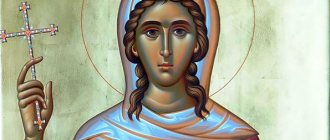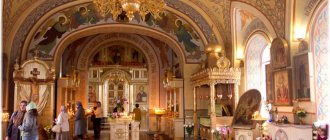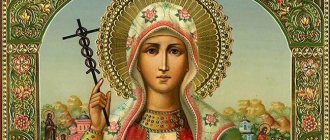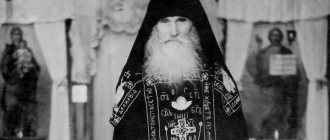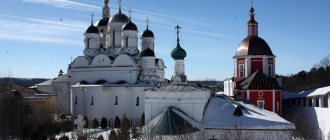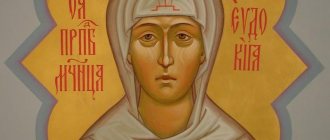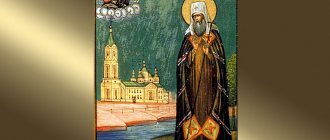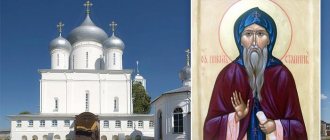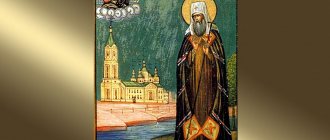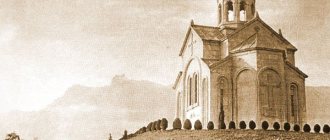Service to God and miracles of the saint
By the age of eighteen, Thekla had become famous in Iconium as the first beauty. Her betrothed was a rich and noble young man who loved her passionately and was looking forward to the wedding.
At this time, the holy apostles Paul and Barnabas came to Iconium from Antioch. They stayed in the house of Onesiphorus, which was located next to Thekla’s parental house.
Paul preached the word of God daily in the courtyard of Onesiphorus, attracting many people, including young men and women. Thekla did not have the opportunity to see the apostle and listened to his sermons, sitting by the window. The Christian faith made a deep impression on her, making her forget about time, food and drink. She was struck by Paul’s words that the chastity of a Christian woman is a special service to Jesus Christ, that a virgin will become the bride of the heavenly Bridegroom and will become like an angel after death.
Thekla, imbued with a fiery faith in Christ, decided to abandon her earthly groom and stopped meeting with him. Theoklia, having learned about her daughter’s religious views, forbade her to listen to the apostle. The mother was angry at her daughter who had become disobedient and stubborn. She either beat and starved Thekla, or caressed and persuaded with tears not to reject marriage with a handsome, rich groom.
Theoklia demanded from the betrothed that he court and seek the love of Thekla. The young man tried to win over the girl, but she did not want to hear or see him. Her mind was occupied with the most beautiful of the sons of men, with whom she mentally held conversations. Thekla, imbued with ardent faith in Christ, decided to remain a virgin, devoting herself to serving God. She was adamant in her intention and did not give in to the persuasion of her mother and groom.
The earthly groom was very upset by the indifference of the bride and complained against Paul to the governor of Iconium, accusing him of corrupting the inhabitants of the city. The saint was captured and thrown into prison. Having learned about this, Thekla ran away from home at night and entered Pavel’s cell, giving her jewelry to the guards for this. When she first saw the apostle, she threw herself on her knees before him and kissed his chains.
In the morning, Paul and Thekla were brought to the governor, who interrogated the saint. In his answers, he did not find any guilt worthy of execution, but ordered him to be punished with whips and driven out of the city. Thekla remained silent to all questions about why she did not want to get married, not taking her eyes off Pavel.
The angry mother demanded that her rebellious daughter be set on fire in order to deter other girls from following her example of celibacy. The prince fulfilled her wish by giving the order to burn Thekla at the stake. The girl herself climbed onto the fire and made the sign of the cross over herself. The set firewood flared up brightly, the flames rose like a wall, but did not harm Thekla. A sudden downpour and hail extinguished the fire, causing no burns to the girl. The divine power frightened the ruler, and he released the innocent woman.
The girl left the city and met the apostle. She begged him to take him with her and baptize him so that she could be resistant to temptation. To which Pavel promised her a font. In Antioch, where the apostle came to preach with Thekla, the governor of Syria drew attention to the young beauty and began to solicit her love. Having not received reciprocity, he began to ask the proconsul to execute her.
Thekla was placed with wild animals, but they did not touch her. The ruler decided that the girl had cast a spell on the predators that was in her clothes. The next time she was left alone with hungry lions and bears without clothes, wearing only a belt. But none of them touched the girl. An attempt to kill her by lowering her into a ditch with poisonous snakes was unsuccessful. Seeing a moat of water in which hungry seals were swimming, Thekla rushed into the pond with the words: “In the name of Jesus Christ I am baptized on my last day!” But a fiery cloud surrounded her body, covering her nakedness and protecting her from beasts.
Finally, the torturer ordered the saint to be tied between bulls so that they would tear her body into pieces. When the bulls began to be stabbed with spears so that they would run away in different directions, the fetters loosened and fell to the ground. After this, frightened by God’s protection, the priest released Thekla.
The saint received a blessing from the Apostle Paul, and spent the rest of her life on a mountain near the village of Seleucia. Thekla preached Christianity, consoled the unfortunate and treated the sick for free. Her fame spread far beyond the village. The sick began to come to her, avoiding healers and magicians. The healers' incomes fell, and they decided to take revenge on the healer. Envious people persuaded the young people to forcibly dishonor the bride of Christ. To inflame their lust and lure them in, the ill-wishers gave the young men wine and paid them money.
Driven by evil intentions, the shameless ones headed to Thekla’s home. The saint decided that they had come for healing, but heard lustful speeches. Realizing what was threatening her, the first martyr fled. But there was no strength to escape from the rapists. Thekla began to pray to God to save her from shame. The rock against which Thekla was leaning parted, and a narrow passage was formed, through which the first martyr emerged from the other side of the mountain range. Here, in a cave near the spring, she lived until she was 90 years old, baptizing into the Christian faith and healing believers.
Relics
“Saint Thekla” (miniature Minology of Basil II, 979-989)
The relics of Saint Thekla were located in the city of Sis, the capital of Cilician Armenia. In 1312-1313, the engagement of the Armenian king Oshin to the daughter of the Aragonese king, Princess Isabella of Aragon, took place. Her father, King Jaime II the Just, in exchange for his daughter's betrothal to Oshin, planned to receive the relics of Saint Thecla to place them in the main cathedral of Tarragona[4]. However, due to protests from the Cilician opposition, dissatisfied with the rapprochement with the Catholic West, the engagement was upset, and the relics remained in the Armenian Kingdom of Cilicia[5]. After the capture of Cilician Armenia by the Egyptian Mamluks, part of the relics of St. Thekla were taken by Christians to Cyprus, where they are still kept in the convent of St. Thekla, located on the outskirts of the village of Mosfiloti, not far from the city of Larnaca[6].
Another part of the relics of Saint Thekla is located in the Orthodox women's monastery founded by Thekla in the city of Maalula. In January 2014, during an attack on the city, militants from the Jabhat al-Nusra group broke into the monastery and desecrated it, burned icons, destroyed the altar, took 16 nuns hostage and held them for several months. The monastery chapel, built more than 1,700 years ago, was blown up, but the militants never found the relics, since they were walled up in the rock; Now the monastery is being revived[7].
The head of Saint Thecla is located in the Milan Duomo Cathedral in the chapel named after her[8].
Part of the right hand of Saint Thekla is located in the only church in her honor in Russia, in the Assumption Feklina women's hermitage, the village of Senino-Pervoye, Kozelsk diocese of the Russian Orthodox Church[9].
Prayers
In their prayer appeals to Saint Thekla, believers ask for healing, improved health, and family relationships.
About strengthening faith
O heavenly flower of chastity, o the first martyr of the New Testament, O Theklo, the bride of Christ, equal to the angels, purified by suffering and infused with the apostolic preaching, shone with purity, prosperous with many deeds and fragrant with glorious miracles! To whom let us liken you, O God-called one, who has trampled on every soul-destroying deception, pouring out the Holy Spirit into a vessel, a reservoir of wisdom, a source of healing, which cools the flames of all passions! Like a bright cloud, come and wash us with the rain of your prayer from mental and physical defilements. I have kindled a fire of love on my skin, make our hearts chaste and ignite love for Christ. As a sign of unyielding courage in suffering, strengthen our wavering hearts with the saving power of the Cross of the Lord; as our strong champion, I will take out those who are at enmity against us, the weak, and give us an invincible fiery shield, so that the cold demons, scorched by your prayers, may flee from us, and our bodies will be like temples of the Holy Spirit. To her, Theklo, wise and virtuous, turn away our eyes from the lusts of this world, so that we may betroth ourselves to Christ with an immaculate conscience; May our lamps be filled with the oil of chastity; we have sinned greatly by not maintaining fidelity to the Bridegroom Christ, and for this reason the imams have shut themselves outside the Bridal Chamber. Otherwise, do not reject your children who are praying to you, but, like a compassionate helper, clothe us in the vestments of the faith of strength, gird our loins with purity for the mortification of passions and the renewal of the spirit; Moreover, adorn our souls with meekness and humility, so that as children of God, like the lambs and sheep of Christ, we may pass through the temptations of this wicked world without restraint, and may we reach the longed-for Palace of Paradise, where all the wise virgins stand before the Throne of the Bridegroom of Christ, chanting the venerable Name of the Father and the Son , and the Holy Spirit, now and forever. Amen.
About healing from burns and illnesses
O blessed holy first martyr, virgin equal to the apostles, the most praiseworthy Theklo, the true bride of Christ, the beauty of the firmament of the church, the mental morning star of Heaven, the most luminous bead of purity and chastity, the fragrant blossom of the garden of Eden! You, who loved the very life of the only Lord more than all the good things, who suffered well for His Name, who was wondrously crowned by Him with the crowns of virginity, martyrdom and apostleship, who were included in the face of Heaven, even though you now rejoice in eternal glory, but did not abandon us who honor you, as a vigilant intercessor and merciful intercessor before God. And since your Bridegroom, sweetest Jesus, has given you the great grace, we humbly pray to you: heed the request of our hearts, do not leave us orphans in this world; visit us in the prison of existing sin, quickly raise us to vigorous repentance, teach our souls and bodies to maintain purity, direct us to the path of good deeds, inhale zeal towards the Gospel, infuse prayers with holy fire and lead us to Divine love. She, the kindly victorious first sufferer, since you can ask for many benefits from the Most Merciful Jesus our Savior, be a quick helper in this life. Intercede for us with angelic protection, heal the wounds and ulcers of the sick, send down grace-filled joy to those who mourn, protect youth and adolescence with purity, assist monks in labor and obedience, maintain indissoluble marriage, create invincible warriors in battles, and waste enemies of the faith and the Holy Church.
Pour out, O chosen one of Christ, your prayer for us to the Lord, that He may grant us a blameless course of life, a painless, comfortable, and peaceful old age; I am not ashamed of my death, the Mysteries of the Most Holy, the Body and Blood of His Divine One, I am a participant in the Kingdom of Heaven, and may we abide there with the ranks of Angels, and sing together with the saints in the Trinity of the glorified God, the Father, and the Son, and the Holy Spirit, to endless ages centuries. Amen.
About healing from illnesses of soul and body
O holy servant of God, equal to the Apostles to the First Martyr Theklo! Having fought a good fight on earth, you have received in Heaven the crown of righteousness, which the Lord has prepared for all who love Him. In the same way, looking at your holy image, we rejoice at the glorious end of your life and honor your holy memory. You, standing before the Throne of God, accept our prayers and bring them to the All-Merciful God, to forgive us every sin and help us against the wiles of the devil, so that, having been delivered from sorrows, illnesses, troubles and misfortunes and all evil, we will live piously and righteously in the present We will be worthy through your intercession, even though we are unworthy, to see good on the earth of the living, glorifying the One, in His saints glorifying God, the Father and the Son and the Holy Spirit, now and ever and unto the ages of ages. Amen.
Notes
- Goodspeed EJ (English) (Russian The Acts of Paul and Thecla // The Biblical World, v. 17, 1901, no. 3, P. 185-190.
- Thekla // Encyclopedic Dictionary of Brockhaus and Efron: in 86 volumes (82 volumes and 4 additional). - St. Petersburg, 1890-1907.
- Lutz D. Schmadel.
Dictionary of Minor Planet Names, 5th ed.: Prepared on Behalf of Commission 20 Under the Auspices of the International Astronomical Union. - Berlin, New York, 2003. - P. 60. - ISBN 3-540-00238-3. - Infanta doña ISABEL de Aragón; Cronica de San Juan de la Peña XXXVIII, p. 231.
- Charles Cawley.
Chapter 3. KINGS of ARMENIA (CILICIAN ARMENIA) (FAMILY of HETHUM).
KINGS of ARMENIA 1226-1341 (unspecified)
.
Medieval Lands
. Foundation of Medieval Genealogy. Access date: April 13, 2013. - Monastery of the Holy Martyr Thekla near Larnaca
- In one of the de-escalation zones in Syria, a world-famous shrine was reopened, REN TV
(September 15, 2017). Retrieved October 7, 2022. - Holy First Martyr Equal to the Apostles Thekla of Iconium. Parish in the name of St. Ambrose of Milan in Milan.
- Rozhneva O.L.
What - let's mow it down?! Go pray first! Modern patericon of the Assumption Feklina Women’s Hermitage // Pravoslavie.ru.
Bibliography
- Barrier, J. W., J. N. Bremmer, T. Niklas, A. Puig I Tàrrech. 2016 Thekla: disciple and saint of Paul in the East and West.
Bristol, CN: Peters. - Elliott, J.C., The Apocryphal New Testament: A Collection of Apocryphal Christian Literature in English Translation,
Oxford: Oxford University Press, 1993. - Johnson, Scott Fitzgerald, The Life and Miracles of Thecla: A Literary Study,
Cambridge, MA: Harvard University Press, 2006. - Macdonald, D. R., Legend and Apostle: The Battle for Paul in the Stories and Canons,
Philadelphia: Westminster Press, 1983. - Kirsch, J.P., Catholic Encyclopedia: “St. Thecla,” Volume XIV, New York: Robert Appleton Company, 1912.
- Ehrman, Bart D., Lost Christianitys: Battles for Scripture and a Faith We Didn't Know,
Oxford University Press, 2005, ISBN 978-0-19-518249-1. - Davis, Stephen J. The Cult of Saint Thecla
. Oxford: Oxford University Press, 2001. Print. - Osiek, Caroline. "The Cult of Thekla: The Tradition of Female Piety in Late Antiquity (review)." Journal of Early Christian Studies
; 11.3 (2003): 422-424. Internet.
Patronage
Thecla is sometimes considered the patron saint of Tarragona in Catalonia (Spain), where the cathedral has a chapel dedicated to her. Her holiday remains the main holiday of the city.[ citation needed
] In Spanish-speaking countries she is also jokingly considered the patroness of computers and the Internet, from homophony with the Spanish and the Catalan word
tekla
("key").[
citation needed
] The earliest cathedral in Milan was also dedicated to her; its baptistery and the remains of its structure are still accessible below the current structure. The Duomo of Este, Veneto is dedicated to Santa Tecla. Lebanon 42 churches are dedicated to Saints Takla or Takla. One of the oldest is the Church of St. Takla in Masqa, Matn district; Built in 1695. The church boasts an 1870 painting of Thekla by an Italian artist. Vincento Lampodico.
In Syria there is the Greek Orthodox Church of St. Thekla in Daraya. In 1849, some people found a cave in Latakia which later became the shrine of Saint Takla.
There are three Roman Catholic parishes in the United States named after St. Thecla: Clinton, Michigan; to Pembroke, Massachusetts; And in Chicago, Illinois.
Several cities and towns are named after her:
- Santa Tecla, formerly Nuevo San Salvador, in La Libertad, El Salvador
- Sainte-Thècle, Quebec, Canada
- Village of Sainte-Tecle in the commune of Peillon, Alpes-Maritimes, France
- Santa Tecla, quarter (frazione) Acireale, Italy
- Santa Tecla de Basto, quarter (freguesia) Celorico de Basto, Portugal
- Neighborhood of Leipzig Thekla in Leipzig, Germany
- Village of Llandegla, Denbighshire, Wales
- Deir Takla (Thekla Monastery), South Lebanon
Content
- 1 Church tradition
- 2 Traditions and interpretations
- 3 Veneration 3.1 Tomb of Saint Thekla, Silifke
- 3.2 Tomb of Saint Thekla, Maaloula
- 3.3 Monastery of Saint Thekla, Larnaca
- 3.4 Saint Menas in Cyprus
- 3.5 Catacombs of Saint Thecla, Rome
- 3.6 Saint Thecla Movement and women's empowerment
